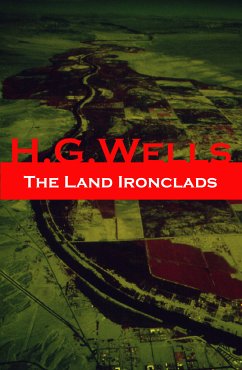
The Land Ironclads (A rare science fiction story by H. G. Wells) (eBook, ePUB)

PAYBACK Punkte
0 °P sammeln!
In "The Land Ironclads," H. G. Wells explores a unique facet of military technology through a speculative lens, envisioning an alternative future where armored vehicles dominate the battlefield. Written in 1903, this short story is notable for its intricate portrayal of the 'land ironclads'-massive armoured vehicles that challenge the very essence of war, hinting at the mechanization of conflict and the ethical dilemmas that arise from such innovations. Wells's literary style is characterized by vivid imagery and a keen sense of irony, positioning his narrative within the burgeoning genre of s...
In "The Land Ironclads," H. G. Wells explores a unique facet of military technology through a speculative lens, envisioning an alternative future where armored vehicles dominate the battlefield. Written in 1903, this short story is notable for its intricate portrayal of the 'land ironclads'-massive armoured vehicles that challenge the very essence of war, hinting at the mechanization of conflict and the ethical dilemmas that arise from such innovations. Wells's literary style is characterized by vivid imagery and a keen sense of irony, positioning his narrative within the burgeoning genre of science fiction that seeks not only to entertain but to provoke thought about technological advancement and its implications on society. H. G. Wells, often regarded as the father of science fiction, was profoundly influenced by the industrial advancements of his time, particularly the evolution of warfare and technology. His early exposure to social reform movements and an education steeped in science and history equipped him with a critical perspective on the trajectory of human progress. These experiences undoubtedly informed his portrayal of militarization and the potential for both innovation and destruction, themes that resonate deeply in "The Land Ironclads." For readers captivated by the interplay between technology and society, "The Land Ironclads" serves as a compelling reminder of the duality of progress. As you navigate Wells's thought-provoking narrative, you will find yourself pondering the moral implications of advancement and reflecting on the cyclical nature of human conflict. This work is essential for those who appreciate speculative fiction and its ability to provide insight into contemporary issues.
Dieser Download kann aus rechtlichen Gründen nur mit Rechnungsadresse in A, B, BG, CY, CZ, D, DK, EW, FIN, F, GR, H, IRL, I, LT, L, LR, M, NL, PL, P, R, S, SLO, SK ausgeliefert werden.












